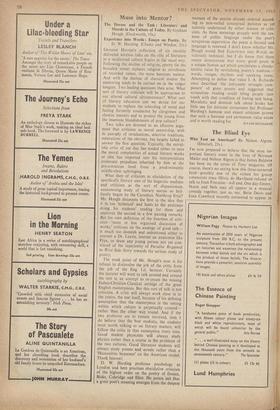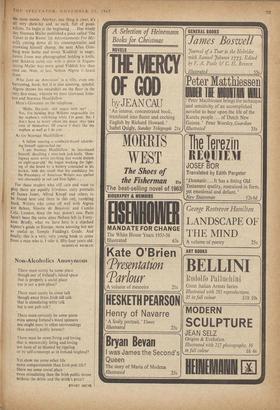The Blind Eye
Who Lost an American? By Nelson Algren. (Deutsch, 25s.) I'M now prepared to believe that the most im- portant literary event in the lives of Norman Mailer and Nelson Algren is that James Baldwin has been on the cover of Time magazine. Of course, there's no saying how this three-cornered feud—possibly one of the richest for gossip columnists since Olivia de Havilland refused to talk to Joan Fontaine—will end. One day Jimmy, Norm and Nets may all appear in a musical comedy together, just as, say, Bette Davis and Joan Crawford recently consented to appear in
the same movie. Anyway, one thing is clear, it's all very show-biz and, as such, full of possi- bilities. To begin at the beginning ... One windy day Norman Mailer published a piece called 'The Talent in the Room' (in Advertisements For My- self), cutting down all his contemporaries and crowning himself champ, the next Allen Gins- burg went home and wrote 'Kaddish' in anger, James Jones was photographed holding a knife, and Baldwin came out with a piece in Esquire saying Mailer was more good Yiddish boy than cool cat. Now, at last, Nelson Algren is heard from.
Who Lost an American? is a silly, even em- barrassing, book, but it is also amusing, spiteful. Algren throws his sweatshirt on the floor in the very first essay, wherein we meet Giovanni John- son and Norman Manlifellow.
Here's Giovanni on the telephone: 'Hello, Da-aady. still angry with me? . . . Yes, I'm holding Roy Wilkens responsible for my nephew's well-being %%Ea: I'm gone. No, I don't have to worry about my niece; they take care of themselves. Of course I don't like 'my
• nephew as well as I do you . . •
As for Norman Manlifellow:
A. fellow wearing a sandwich-board advertis- ing himself approached me.
'l am Norman Manlifellow.' he introduced himself, sheathing a nine-inch jack-knife, 'Hem- ingway never wrote anything that would disturb an eight-year-old.' He began working the light- ing of the board by a battery concealed in his pocket, with the- result that his candidacy for the Presidency. of American Writers was spelled out alternately in red and blue lights . , For those readers who still care and want to play there are equally frivolous, catty portraits of James Jones, Alfred Knopf and others to be found here and there in this coy, rambling book. Writers who come off well with Algren are Behan, Simone. de Beauvoir and Camilo Cela. London, since the war, doesn't rate. Paris hasn't been the same since Nelson left in Forty- nine. Briefly, what we have here is a slipshod hipster's guide to Europe. more amusing but not as useful as Temple Fielding's Guide. And finally; this is a very, very young book to come from a man who is, 1 take it, fifty-four years old.
MORDECAI RICHLER































































 Previous page
Previous page